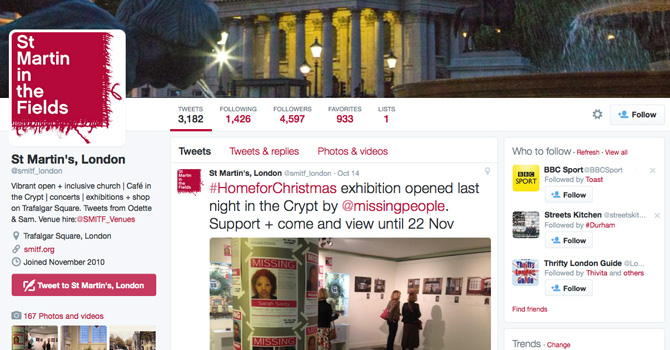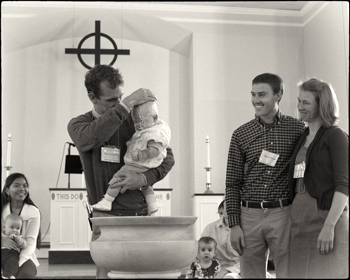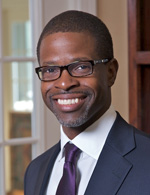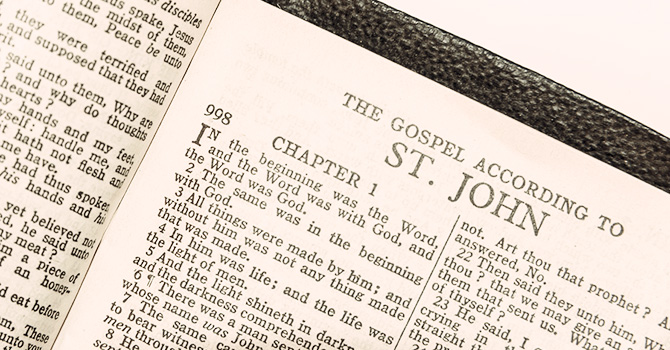Editor’s note: Faith & Leadership offers sermons that shed light on issues of Christian leadership. A version of this sermon was preached at St Martin-in-the-Fields in London on Sept. 13, 2015.
I’m going to start with what social media means for society, then move to the church, and finally explore what it means for God.
Not long ago, I was speaking at a diocesan clergy conference. Near the front of the audience, there was a newly ordained person. I could tell the person was newly ordained, because they were wearing a clerical collar at a clergy conference -- they hadn’t gotten the memo that that wasn’t cool. But their clerical shirt was multicolored and edgy, and that was also a giveaway, because clergy soon realize that there’s nothing cool about a clerical shirt, whatever color it is, and they might as well revert to something unobtrusive and dull. As soon as I finished my 45-minute address, my friend with the multicolored shirt raised a hand, saying, “There’s a huge storm on Twitter after I posted what you said about power.” I said, “Tell me what you posted.” My media-savvy friend quoted some words. I was dismayed. “But that’s not what I said,” I insisted. “Well, it’s set off a huge storm,” my friend replied. I said nothing. But what I wanted to say was, “If you’d listened to the lecture rather than tweeting all the way through it, you might have heard what I actually said.”
Think about the way that incident crystallizes the social media revolution upon which we’re embarked. Once upon a time there was an Internet, and it was like a great billboard on which could be found easily a number of things that were already available -- but perhaps less accessibly -- elsewhere. Then the Internet became interactive: articles would have comment boxes underneath them, and a host of well-informed, opinionated or sometimes very angry correspondents would engage with something that had been blogged or posted. The host of the website would “angst” about balancing free speech with wise and constructive utterance, and whether to censor the views of often-anonymous contributors. But in the last 10 years, we’ve slain the host, and through Twitter and Facebook, we now have wholly participatory conversations with no chair or editor, only mechanisms for choosing which conversations to follow and who one wants to befriend or listen to.
Each of these three generations of the information revolution has had profound effects. If you go back to my lecture at the conference, when I stand up to speak, the audience has access, through text and video, to a host of things I’ve said before, countless things others have said on the same subject, and a myriad of other messages and information that might be a great deal more interesting and engaging than listening to me -- and all on a little device smaller than a person’s hand. In that context, I have to work hard to be worth all those people’s time, and very hard to keep eye contact and not let their attention divert to the gadget in their hand.
What this means is that relationships start in different ways. When someone first attends St Martin’s, they’ve usually begun by sounding us out on our website. When a person makes an appointment to see me, they’ve often done a bit of homework on me on the Internet. I once met a famous American poet who was shocked and angry when I asked her a question that, if I’d read her biography on the Web, I’d have known not to ask. I assumed she was a stranger; she took for granted she was public property. But it also means we do things at any time of day. Shopping changes, because we can buy things at any hour. We get very impatient if we can’t get things on demand. This isolates us, because we miss the human contact of meeting people in the course of our journey down the high street; but it can connect us with people on the other side of the world in an instant. The whole nature of human interaction changes: we can be a member of several parallel communities, according to our hobbies, politics, professional associations and interests -- and our neighborhood and family relations need not be the most pressing of these connections.
But returning again to my clergy lecture, there’s another dimension, which is that the whole notion of one person being wise and knowledgeable and everyone else sitting at their feet feels like it comes from another era. Authority has changed: it doesn’t come from accreditation, like academic degrees conferred or ordination undergone or job title recognized; it comes from likes and hits and trends and follows. The whole process of sharing information has been democratized. When I taught the introduction to ethics course at an American seminary, one end-of-semester evaluation sheet demanded the student be reimbursed not just by the college but by me personally for what he’d calculated as his outlay of $100 per lecture, because everything I’d said was available elsewhere. I don’t know what new information he wanted me to offer in an introductory course that was by definition discussing material available elsewhere. But the experience showed me that the authority of the professor is unavoidably subverted in the Internet age. A doctor faces the same issue with a patient: if the patient is coming with a breathing problem, it’s highly likely the patient has scoured the Internet for diagnoses and possible treatments, research that inevitably becomes the backdrop to evaluating anything the doctor might say. It becomes increasingly difficult to distinguish between the knowledge and information that’s available to everyone and the wisdom of the professional that discerns which item of knowledge is most appropriate for today.
These changes are bringing about a social revolution. But perhaps more disturbing is the third dimension that my interaction with the multicolor-shirted cleric at the conference disclosed. I refer to the reaction when I replied, “But I didn’t say that.” What followed wasn’t an apology -- just a shrug of the shoulders that said, “Well, it’s on Twitter now; it’s out there.” At moments like this, you wonder if truth has got trodden down by comment, reaction and the froth of opinion and instant judgement. It’s some consolation that there’s so much comment out there that one misunderstanding doesn’t count for a great deal. But try telling that to someone whose misquotation or unwise offhand remark has led to massive national or international reaction and consequent shame and opprobrium and ostracism. It may be true that nothing lives on the Web for very long -- but it’s even truer that nothing ever dies. Once put there, it can be next to impossible to remove. In 20 years’ time, you can find that you’ve missed out on a job because the shortlisting panel did a Web search and found a stray Twitter debate that may be irrelevant and perhaps was never even true. The casualties are not restricted to individuals whose records can never be cleared or names given proper dignity; the more far-reaching casualties are truth and justice themselves, since the discipline of peer review or the practice of public compliance or the justice of libel laws seldom if ever applies to the Web. Everything is up for comment, nothing can truly be trusted, and communication is speeded up and expanded as fast as it is devalued. The Babel that became Pentecost has become Babel again.
Let’s turn now to what social media means for the church. The church has three dimensions -- relating to God, to one another and to the world (or worship, ministry and mission, as they’re usually called) -- and the pressing question is always how much you need one to engage in the other two (or how much you need the other two to engage in one). So people say, “I can relate to God (or truth or my soul) without needing other people,” which is often called “spiritual but not religious.” Or people relate closely to church but not world, which is called being a “holy club.” Or people are taken up with making a better world to the neglect or bypassing of God and the church, which is sometimes known as the “social gospel.”
All of these tendencies stand to be exacerbated by the communications revolution and social media. It’s easy to access all sorts of spiritual images, videos and texts from the Web, many of which are much slicker and more attractive than what’s on offer at your local parish church. At my last church, we got huge plaudits for webcasting our main act of worship, but we found that a lot of people who watched it did so from only a mile or two away and could quite easily have showed up in person. By offering a webcast, we may have implicitly been encouraging the tempting idea that you can have God and even church without troubling yourselves with the untidiness of other people. Social media facilitates holy clubs, because you can engage in plenty of Facebook and Twitter conversations while screening out the likelihood of encountering someone with whom you seriously disagree, or ever needing to trust one another as a local congregation does when setting its budget or framing a policy for safeguarding vulnerable children and adults. And social media affirms the inclination to make the world a better place without the complications of God or church, because it gives us access to countless online campaigns and the chance to share widespread chat room outrage about questions and concerns of which we have no firsthand knowledge and toward which we have no intention of developing personal engagement or investment.
While these are dangers, they shouldn’t become excuses for wistful lament. The challenge of that interaction with the multicolor-shirted cleric at the conference was not that the cleric was inattentive and I was misrepresented; it was that the cleric was engaging with the church of the future and I wasn’t adapting fast enough to a new reality. To adapt to the social media revolution, the church needs, first, to identify its goal, and second, to be imaginative, flexible and proactive in adopting and incorporating such media as can advance its goal. As I understand it, the goal is to draw all people to be with God, one another and the world in such a way that embodies trust, honor, joy, mutual flourishing, gentleness, peace and love. Ideally, those qualities are discovered, shared, embodied, expressed and advanced in face-to-face relations. But social media can hasten the day when such relations are realized. Social media can inform, challenge, connect and enrich the church in its engagement with the isolated, the oppressed and the antagonized, and can offer the church opportunities to witness and make known the gospel of God in Christ through a host of new channels. Not all media offer promising routes to advancing the kingdom: some are addictive, distracting, demeaning or cruel. But others are useful, accessible and popular, and Christians should be engaging them as quickly as, 500 years ago, they realized the power of the printing press to spread the words of Scripture. Without the printing press, there would have been no Protestant Reformation 500 years ago. But the printing press also democratized discipleship, because everyone could make their own judgments about the meaning of the Bible. Today, that democratizing is going a step further, and the church is becoming less a voice of authority to decree and proclaim and announce, and more an agent of hospitality to convene and affirm and forgather. The Internet may be about to trigger a new reformation. Perhaps it needs to.
Finally, a few words about what all of this means for God. Is social media a trend in culture or a transformation of truth? The answer, I suspect, lies in how we understand the roles of the Second and Third Persons of the Trinity -- Jesus and the Holy Spirit. Jesus, whose role is to be God in relationship with us, embodying and fulfilling the covenant with Israel, was an identifiable person who spoke with authority and did astonishing things. He was frequently misunderstood, and some of his words are playful and provocative rather than precise and prescriptive, but he is nonetheless a historical figure one can point to with confidence and accuracy. The Holy Spirit, by contrast, whose role is to make Christ and his forgiveness and eternal life present today, is much harder to pinpoint, even though its activity is widespread and constant.
The institutional churches have struggled with this elusiveness of the Holy Spirit. They’ve created systems that try to offer the tangibility of Christ. Roman Catholics have the pope, the living interpreter of God’s will. Protestants have the Bible, the constant witness of the action of God. While these ways of preserving confidence in the authority of the church have served Christians well for many centuries, they’ve always been in danger of narrowing the church’s perception of what God can do, limiting the power of God to the written word or the ordained hierarchy, containing the wind of the Spirit within a prescribed range.
You can see the analogy between what social media is doing to society and the church and what it is making us see about God. Social media is opening out society, undermining some fixed institutions, subverting established authority, leveling hierarchies and unleashing energy. Some of the changes are scary, some unwelcome, but together they’re expanding influence and connection and visibility to the many, not the few. What this is helping us see about God is that the Holy Spirit is much more unpredictable, subversive and playful than the church would usually like it to be. Authority can’t be controlled by the powerful and the qualified, and God can’t be limited by clergy or Scripture. It makes for an uncertain, roller-coaster experience of faith for those who want their religion tidy and measured; but it’s an invitation to a kingdom more radical, more wonderful and more joyful than most Christians dare to believe in. The fixed points are the same: God was fully disclosed in Christ in Bethlehem, Galilee and Jerusalem; and Christ will come again with the new Jerusalem and a new heaven and earth. God isn’t changing character. But if social media pushes Christians, reluctantly, grudgingly and tentatively to recognize the uncontrollable, ever more unmanageable and yet thrillingly redemptive nature of the Holy Spirit, it will indeed have proved a blessing beyond measure to the church.


















